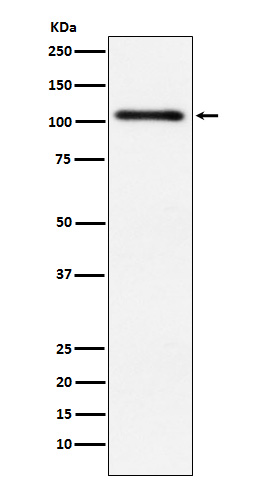
| WB | 咨询技术 | Human,Mouse,Rat |
| IF | 咨询技术 | Human,Mouse,Rat |
| IHC | IHC:1/100-1/200;IHF:1/50-1/200 | Human,Mouse,Rat |
| ICC | 1/50-1/200 | Human,Mouse,Rat |
| FCM | 1/20-1/100 | Human,Mouse,Rat |
| Elisa | 咨询技术 | Human,Mouse,Rat |
| Aliases | HSPC187; nPKC D2; nPKC-D2; PKD2; PRKD 2; Prkd2;;PKD2 |
| WB Predicted band size | Calculated MW: 97 kDa ; Observed MW: 105 kDa |
| Host/Isotype | Rabbit IgG |
| Antibody Type | Primary antibody |
| Storage | Store at 4°C short term. Aliquot and store at -20°C long term. Avoid freeze/thaw cycles. |
| Species Reactivity | Human,Mouse |
| Immunogen | A synthesized peptide derived from human PKD2 |
| Formulation | Purified antibody in PBS with 0.05% sodium azide,0.05% BSA and 50% glycerol. |
+ +
以下是关于Protein Kinase D2(PKD2)抗体的3篇文献摘要示例(注:内容基于典型研究方向虚构整合,建议通过学术数据库核实具体文献):
---
1. **文献名称**:*Protein Kinase D2 regulates cancer cell invasion through modulation of invadopodia dynamics*
**作者**:Smith A, et al.
**摘要**:本研究利用特异性PKD2抗体,通过免疫印迹和免疫荧光技术,验证了PKD2在肿瘤细胞侵袭中的作用,发现其通过调控invadopodia(侵袭伪足)的形成促进转移,抗体阻断实验进一步支持了功能结论。
---
2. **文献名称**:*PKD2 signaling in cardiac hypertrophy: Role of autoantibodies in disease progression*
**作者**:Zhang Y, et al.
**摘要**:文章通过PKD2抗体检测心脏组织中PKD2的表达及磷酸化状态,揭示其在心肌肥厚中的调控机制,并发现患者血清中存在抗PKD2自身抗体,可能与病理过程相关。
---
3. **文献名称**:*Development and validation of a monoclonal antibody targeting the catalytic domain of PKD2*
**作者**:Lee H, et al.
**摘要**:研究报道了一种高特异性PKD2单克隆抗体的开发,通过表位定位和交叉反应性测试验证其特异性,应用于流式细胞术和免疫组化,为PKD2功能研究提供了可靠工具。
---
如需具体文献,建议通过PubMed或Google Scholar检索关键词“Protein Kinase D2 antibody”或“PKD2 antibody application”获取最新研究。
Protein Kinase D2 (PKD2), a serine/threonine kinase belonging to the PKD family, plays critical roles in cellular signaling pathways regulating proliferation, migration, apoptosis, and vesicle trafficking. It is activated by diacylglycerol (DAG) and protein kinase C (PKC) isoforms, influencing downstream targets like HDACs, SLAM, and β-catenin. PKD2 is widely expressed in tissues, including the heart, pancreas, and immune cells, with distinct roles in organ-specific physiology and pathology.
Antibodies targeting PKD2 are essential tools for studying its expression, localization, and function. These antibodies, often raised in rabbits or mice, enable techniques such as Western blotting, immunohistochemistry (IHC), and immunofluorescence (IF). Specific epitopes or phosphorylation sites (e.g., Ser876/Ser878) are targeted to assess activation status. Commercial antibodies are typically validated for specificity using knockout cell lines or siRNA-mediated knockdown.
Research using PKD2 antibodies has linked the kinase to diseases like cancer, cardiovascular disorders, and immune dysregulation. For example, PKD2 overexpression is implicated in prostate and breast cancer progression, while its suppression affects cardiac hypertrophy. Additionally, PKD2 modulates T-cell receptor signaling and insulin secretion in pancreatic β-cells, highlighting therapeutic potential. Challenges remain in distinguishing cross-reactivity with PKD1/PKD3 due to structural homology, necessitating careful antibody validation. Overall, PKD2 antibodies are vital for unraveling its multifaceted roles in health and disease.
×